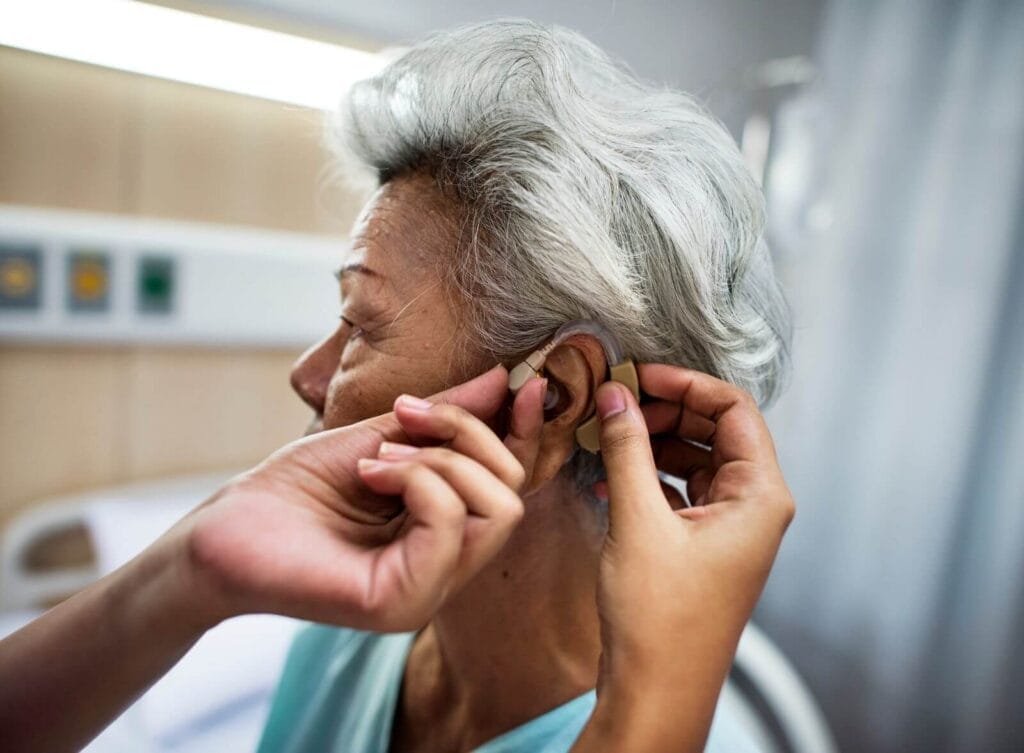
Hearing loss in seniors is a common issue that can lead to loneliness and social isolation due to lack of communication as well as physical issues like an increased risk of falling. Hearing aids can be an essential aspect of daily life for some older adults, but they often come at a significant cost. This article suggests various options for older adults regarding how to pay for hearing aids.
The cost of hearing aids
The price of hearing aids in the U.S. varies widely, from under $1,000 to over $8,000, with an average cost of $4,672 for a pair. This high expense can present a serious financial challenge for seniors and retirees on a fixed income. Older adults have options when it comes to paying for hearing aids. Some of the options include:
- Private pay.
- Medicare Advantage.
- Medicaid.
- VA health care.
- Veterans benefits.
- Nonprofit organizations.
- AARP.
Find the Best Hearing Aids For You!
Private pay
The most straightforward way to pay for hearing aids is out of pocket, otherwise known as private pay. Paying with your own money means you’ll use your own funds to cover the costs of hearing aids. The downside is that you’ll pay for 100% of the costs on your own. Some companies may offer financing options to spread the costs over several months. Be sure to check the terms so you don’t pay too high an interest rate.
On the plus side, hearing aid expenses may be tax deductible. Under federal guidelines, many medical expenses are considered eligible deductions. Because hearing loss is classified as a medical condition, the costs associated with treating it — such as purchasing hearing aids — may be deducted on your income tax return. There are rules about whether you can consider the costs tax-deductible expenses, so you’ll want to talk with a trusted tax professional before assuming you can deduct the cost of hearing aids on your next tax return.
Medicare Advantage
Many people believe that original Medicare pays for hearing aids and related services. Unfortunately, that isn’t necessarily the case. While original Medicare (i.e., Medicare Part A and Part B) may pay for some hearing-related items like diagnostic and balance exams ordered by your doctor or health care provider, it does not cover the cost of hearing aids or exams for hearing aid fittings.
Alternatively, Medicare Advantage plans (i.e., Medicare Part C plans), which provide a different option for receiving Medicare benefits, may include coverage for hearing aids, hearing exams, and other related services. Because Medicare Advantage plans are offered through private insurance carriers, not all plans are the same. If you have a Medicare Advantage plan, you’ll want to contact your provider to learn if hearing aids are covered in any way.
Medicaid
Medicaid is a joint federal and state program that helps cover health care costs for qualifying individuals with limited assets and income. Although the federal government sets certain rules that all states must follow, each state can run its own Medicaid program.
Because of this, Medicaid benefits and eligibility requirements can differ from one state to another. For instance, while some states, like Georgia, Louisiana, and Arizona, don’t cover hearing aids at all through their Medicaid programs, others, such as Minnesota, provide a wide range of coverage, including hearing aid repairs, parts and accessories, and programming. To learn more about whether Medicaid covers hearing aids where you reside, visit your state’s Medicaid website.
VA health care
The Department of Veterans Affairs (VA) may cover hearing aids if you are enrolled in VA health care and meet certain eligibility criteria. Your hearing loss must be related to your military service and have been caused or aggravated by your time in the service. Additional eligible Veterans include former prisoners of war and Purple Heart recipients, among others. If your doctor recommends hearing aids, they — along with future repairs and batteries — will typically be covered, provided you maintain VA eligibility for care.
Veterans benefits
The Aid and Attendance benefit through the VA may also help with the cost of hearing aids and other health care needs for seniors. This benefit provides tax-free financial support for qualifying military Veterans and their spouses. Recipients qualify by meeting asset and income limits and having cognitive or physical impairments that cause the senior to require help with daily living activities like bathing and dressing. Once they qualify, the older adult can use the additional income for anything, including hearing aids and related services or other types of senior care.
Nonprofit organizations
Some nonprofit organizations provide assistance in paying for hearing aids. For instance, many local Lions Clubs implement programs and projects within their communities that directly assist individuals. You may also donate used or unneeded hearing aids through the Lions Club via the Hearing Charities of America to help others who may need them. To learn more about local organizations that may provide assistance in obtaining or paying for hearing aids, contact your local area agency on aging. You can also check the Hearing Aid Project for national and state resources.
AARP
AARP offers savings on hearing aids and other types of hearing-related care, including up to 20% on hearing aids and 15% on hearing aid accessories. In addition, with the AARP Hearing Solutions program through UnitedHealthcare, members may receive a hearing exam and consultation at no cost.
There are options to pay for hearing aids
Although the cost of hearing aids is generally high, there are several ways to help pay for them, including private pay, Veterans benefits, and nonprofit organizations. The best place to start is with a qualified advisor who can discuss the available options for your particular situation.








